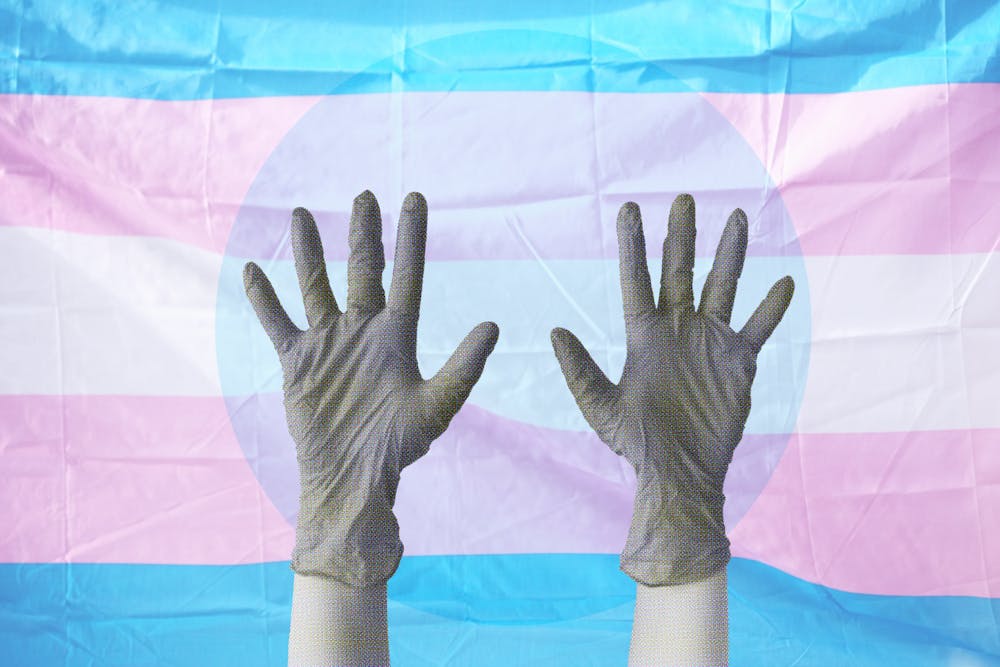
If Laura* worked as a barista at Starbucks, or a delivery driver for Amazon, she would have excellent transgender health care coverage. She would visit doctors who specialize in gender-affirming care, and she would pursue the procedures that allow her to live as herself. Gender transition, while never easy, would be possible with the support of her employer.
Laura currently works as a graduate student at the University of Pennsylvania. She has been seeking out gender-affirming care through Aetna Student Health for the past two years. Why does her employer — a university that prides itself on inclusive and equitable policies — fail to provide her with adequate transgender health care coverage?
As of 2017, the University has advertised its transgender health care as part of the Aetna Penn Student Insurance Plan (PSIP). The 2016-17 annual report from Student Health Service boasts:
“The Student Health Insurance Advisory Committee (SHIAC) worked collaboratively with Aetna Student Health to develop a plan that is both affordable and comprehensive for students. One of the changes for the FY18 plan included coverage for gender-transition related electrolysis and tracheal shave, which represents a further step forward for the transgender community.”
When Laura arrived at Penn, she asked another trans woman who worked for her department how to use these benefits. Her friend laughed. Those benefits, she learned, are not real. You cannot use them unless you have what Aetna calls “gender reassignment (sex change) treatment.” She was shocked. Requiring trans women to have surgery before they can access basic benefits seemed backwards and inhumane. Why have transgender students and employees been prevented from using these benefits while at Penn?
After months of emailing with staff at Aetna and the LGBT Center, she learned that one of the advertised procedures — a tracheal shave — would count as the aforementioned “gender reassignment (sex change) treatment.” None of the trans students with whom she had spoken knew that this procedure fulfilled Aetna’s requirement.
She was ecstatic. A tracheal shave is a crucial part of a woman’s transition, because it allows her to appear less visibly assigned male at birth. This procedure would cost upwards of $7,000 if she paid out of pocket. Were it not for this coverage, she would not be able to afford this procedure.
So, she scheduled a consultation with a nearby surgeon, waited several months for an appointment, asked a therapist to evaluate her gender dysphoria and write a letter verifying the medical necessity of the procedure, and had her surgeon’s intake coordinator send in a prior authorization to Aetna. Throughout this process, she was classified as having a “gender identity disorder,” in keeping with Aetna’s clinical policy bulletin on gender-affirming surgery. Her ICD-10 diagnostic code was F64.9, or “Gender identity disorder, unspecified.”
Her prior authorization was immediately denied by Aetna with the following justification:
“We reviewed information received about your condition and circumstances. We used the Clinical Policy Bulletin (CPB): Gender Affirming Surgery and your plan documents. Based on CPB criteria and the information we have, we're denying coverage for the requested procedure to be performed as part of your gender transition. This procedure is considered cosmetic by our CPB and your plan because it is meant to improve appearance, not to correct a physical problem that affects your daily activities.”
She was surprised. She chose to come to Penn because the University announced its commitment to the well-being of transgender students and employees. The message she received from Aetna contradicted the University’s dedication to inclusion.
Peer institutions, such as Princeton University, provide substantial transgender health care coverage through Aetna Student Health. The University of Michigan recently revamped their gender-affirming health care plan.
Penn needs to provide comparable transgender health care coverage. For a start, the University must offer the gender-affirming care that it has advertised since 2017. In order to make that care accessible, the University needs to provide an advocate familiar both with Aetna’s policies and with the World Professional Association for Transgender Health standards of care.
Penn’s transgender health care is determined by how Aetna representatives interpret claims. Many of these representatives are not familiar with gender-affirming procedures, and many have not previously worked with trans people. Students and employees are forced to self-advocate in a system that is overwhelming, unfamiliar, and often harmful to them.
Penn can do better for its trans students and employees. The experience of gender dysphoria is debilitating and unlivable. The attempted suicide rate among trans and nonbinary adults is over 50%. Robust transgender health care is necessary and life-preserving.
Students and employees at Penn need better gender-affirming care now.
*Name has been changed for privacy reasons.
AVA KIM, DAVY KNITTLE, AYLIN MALCOLM, NAT RIVKIN, and SAM SAMORE are all Ph.D. candidates in the Department of English.
The Daily Pennsylvanian is an independent, student-run newspaper. Please consider making a donation to support the coverage that shapes the University. Your generosity ensures a future of strong journalism at Penn.
Donate



